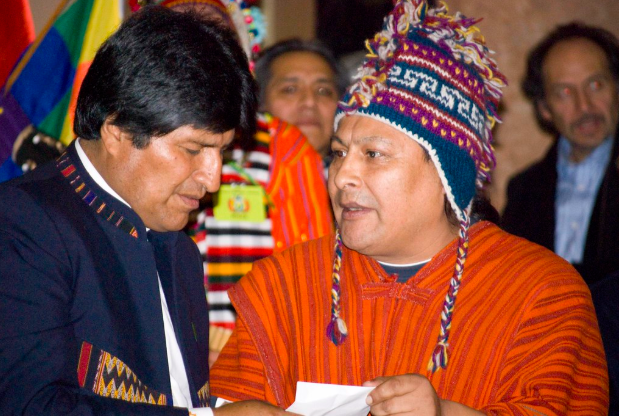In the aftermath of the ouster of former President of Bolivia, Evo Morales, many suspected a right-wing coup had taken place. Now, a month later, the status of Indigenous peoples in Bolivia hangs in the balance.
“Evo Morales speaking to a man wearing the Lluch’u, the knit cap typical to Andean indigenous peoples.” Sebastian Baryli. CC BY 2.0
In 2005, Evo Morales, of Aymara indigenous descent, was elected to become the first indigeneous President of Bolivia. Bolivia identified itself as a plurinational state following the ratification of a new Constitution in 2009, and is home to more than 36 indigenous peoples. In 2017, an estimated 48% of the population of Bolivia above the age of 15 was of indigeneous origin. Morales’s party, Movimiento al Socialismo (MAS--Movement Towards Socialism), represented a growing progressive force against the backdrop of the historically-conservative nation. Morales saw significant success over his three terms, stabilizing the Bolivian economy, spurring economic growth, reducing poverty significantly and bringing those living in extreme poverty down to half its previous rate, while heightening literacy rates across Bolivia. Under Morales, Bolivia became a more inclusive place: he instituted the Wiphala, which represents the plurinational status of Bolivia, as the nation’s second flag, and promoted a previously unparalleled number of women to his cabinet.
In 2016, Morales held a referendum in order to extend the term limits established within the 2009 Constitution, which was ultimately rejected in a 51% to 49% vote. However, in 2018 Morales appealed to the Bolivian Constitutional Tribunal, which allowed Morales to run for re-election for a fourth term as President of Bolivia. Although Morales was elected for a fourth term in October of 2019, an audit by the Organization of American States determined the election illegitimate, and many had questioned the legality of the Tribunal’s decision in 2018 even before the election came to pass. In the midst of protests that left over 30 dead and 700 injured, and under extreme pressure from the military, Morales stepped down and fled to Mexico.
In the immediate aftermath of the ouster of Morales’s administration, many questioned whether there had been a coup. Calls for Morales’s resignation began in the right, and gained traction; ultimately, Morales resigned following military coercion against him and his party. Although there has been a precedent for right-wing coups in Latin American history, especially aided and abetted by the United States, the case of Morales’s administration is complicated. While the military intervention does constitute an illegal seizure of power, the discontentment for Morales did not arise in a vacuum. Opposition leaders and former supporters alike felt that a fourth term meant a clear violation of the Constitution Morales himself had worked to implement, and many more agreed that Morales had begun to lose touch with the population after 14 years in office. Many of his former indigenous supporters were angered by Morales’s approval of a hydroelectric dam in indigenous territory.
Morales’s resignation triggered many of his top officials and closest political associates to resign as well, leaving the presidential seat to Jeanine Añez, formerly vice president of the Senate of Bolivia. The Constitution stipulates that a new election must be called for within ninety days, and upon taking power Añez openly assured the country that her taking power was purely transitional. Many have doubted Añez’s words, and have called for her resignation given her connection to the right-wing opposition in Bolivia.
Anti-indigenous graffiti has appeared throughout Bolivia, as well as videos depicting police cutting the Whiphala emblem from their uniforms. These actions have been empowered by Añez herself, in the past implicated in anti-indigenous tweets, who has called for police repression of pro-Morales protestors. Notably, Añez’s cabinet, even if temporary, contains no indigenous representatives, and it seems that she has already begun the process of rolling back strides made under Morales towards socialism and inclusion. In this way, growing worries that the rise of a new right-wing government will revive festering anti-indigenous sentiment are well-founded. Ultimately, the political uprising in Bolivia leaves the future of indigenous rights in danger, as outrage towards Morales has opened the floodgates for discrimination against the indigenous population as a whole.
Hallie Griffiths
Hallie Griffiths is an undergraduate at the University of Virginia studying Foreign Affairs and Spanish. After graduation, she hopes to apply her passion for travel and social action toward a career in intelligence and policy analysis. Outside of the classroom, she can be found, quite literally, outside: backpacking, rock climbing, or skiing with her friends.


